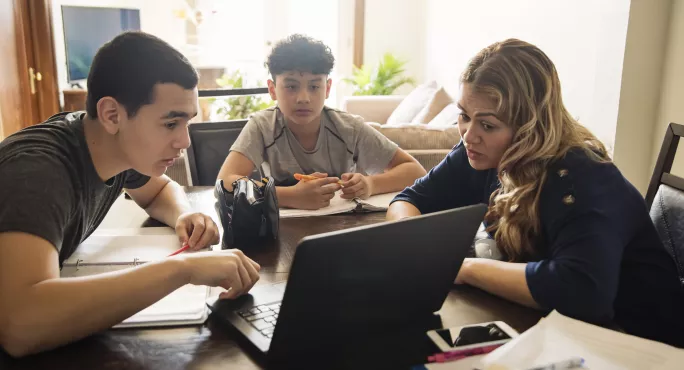
Remote learning reports: what you need to know

Two new reports on remote learning have been published this afternoon.
They carry some upbeat messages about improved remote learning since the first lockdown, but also raise concerns about the strain being put on school staff and families.
These are the second and third Education Scotland reports on remote learning in lockdown, the first - focusing on feedback from local authorities - having been published last Friday.
The new reports look at feedback from schools and from families.
Background: Last week’s first review of remote learning
Scottish Budget: 6 ways Covid has hit poorer pupils the hardest
Opinion: ‘The expectations of online learning are higher’
Coronavirus lockdown: Fears over ‘Big Brother’ remote-learning inspections
For the schools report, Education Scotland inspectors spoke - during the week beginning 18 January - with 5 per cent of schools in the country. Some 128 schools were involved, including 74 primary, 36 secondary and 18 special schools, and every local authority was represented.
Remote learning in Scotland: Key findings
Here are some key findings in the schools report:
- “Overall, there is clear evidence that schools have learned from the previous lockdown and are continuing to improve their remote learning offer.”
- “In almost every school, the workload pressures and wellbeing of staff [are] identified as a concern,” the report finds, particularly for those who have children of their own involved in remote learning.
- “There is more work to be done at the primary stages to ensure children are learning across the breadth of the curriculum.”
- “In almost all secondary schools, the full timetable is delivered with some changes to the style of delivery in practical classes.”
- “Almost all secondary schools report that teachers, young people and parents are anxious about the cancellation of national examinations.”
- Headteachers “would welcome high-quality, targeted and specific online professional learning on leading and managing change”.
- “Some schools have [since the first lockdown] trained all staff, including support staff, in the use of digital technologies.”
- “Teachers of practical subjects are using some creative approaches to deliver learning. These include teachers who use digital tools to demonstrate practical activities such as science experiments, posting practical activities online, and delivering packs such as sewing and cooking packs to support remote learning.”
- “The balance of live learning, independent activity and prerecorded lessons varies greatly from school to school”; some schools are “not yet delivering any live learning” but in most schools there is some live learning each week.
Education Scotland has published two new national overview reports focused on the remote learning experiences of parents, carers, learners and schools. The reports celebrate what is working well, identify challenges and where further support is required: https://t.co/6YzQX1I7Gk pic.twitter.com/l095bUqKZg
- Education Scotland (@EducationScot) January 29, 2021
- Access to online learning is a common concern, with schools “working hard to reduce barriers to remote learning” by distributing digital devices to pupils who need them most.
- Some special schools are finding “significant challenges in supporting children and young people [in] accessing remote learning”.
- “Almost all schools report improved engagement levels of children and young people in remote learning compared to the previous lockdown.”
- Pupils in a minority of schools “do not yet have their entitlement to a daily check-in with staff”.
- Schools say “it is often difficult to judge how much support learners receive at home and, therefore, how much they are able to do independently”, and would welcome further professional learning and guidance on effective approaches to assess children’s and young people’s progress during remote learning”.
For the second report published this afternoon, inspectors spoke to parents, carers and learners through a series of focus groups between 19 and 25 January, organised with help from schools, the National Parent Forum of Scotland (NPFS), Connect, Children in Scotland and Young Scot.
Its findings include:
- Parents “recognise the huge effort schools are making” and say that teachers have “built on the experience from the previous lockdown to improve communication with learners and parents”.
- Parents and pupils want ”more clarity and information” about SQA qualifications.
- Families raise significant concerns about the negative effects of remote learning, and Covid-19 more generally, on both education and mental health.
- Parents say that ”wellbeing needs to be the key focus of both remote learning and to be the highest priority when all [pupils] return to school.
- “The loss of social interaction and the resulting feelings of isolation, sadness and loneliness is particularly challenging for some children and young people.”
- Some parents say remote learning has improved their children’s wellbeing and learning; a few say that remote learning means their child feels more engaged since, for example, they can attend live lessons alongside peers which is not always their experience in school, or that the “absence of homework can reduce stress and allow for more time in the day for family time”.
- Almost half of primary pupils at times share a digital device with someone else at home, but this was lower for young people at secondary school (about 22 per cent).
A Scottish government update on when school buildings will reopen fully is scheduled for Tuesday 2 February.
You need a Tes subscription to read this article
Subscribe now to read this article and get other subscriber-only content:
- Unlimited access to all Tes magazine content
- Exclusive subscriber-only stories
- Award-winning email newsletters
- Unlimited access to all Tes magazine content
- Exclusive subscriber-only stories
- Award-winning email newsletters
You need a subscription to read this article
Subscribe now to read this article and get other subscriber-only content, including:
- Unlimited access to all Tes magazine content
- Exclusive subscriber-only stories
- Award-winning email newsletters
- Unlimited access to all Tes magazine content
- Exclusive subscriber-only stories
- Award-winning email newsletters